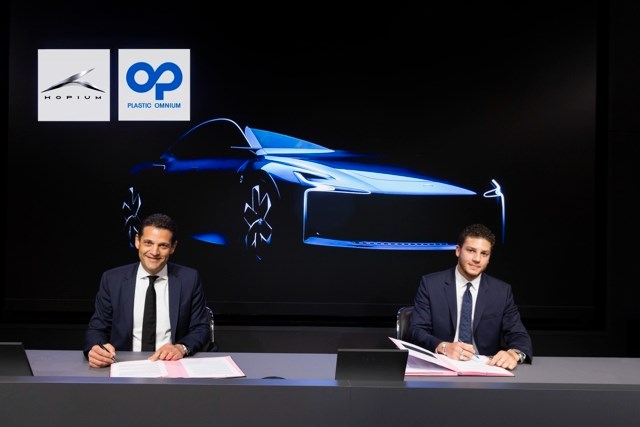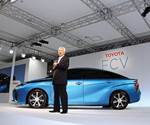Plastic Omnium develops type IV hydrogen storage vessels for Hopium high-end sedan
Aiming to be the first French hydrogen-powered sedan to hit the market in 2026, the Hopium Māchina will be equipped with a 700-bar hydrogen vessel integrated into the vehicle chassis.

Laurent Favre, CEO of Plastic Omnium and Olivier Lombard, chairman and CEO of Hopium signing the agreement. Photo Credit: Plastic Omnium
Plastic Omnium (Île-de-France, France) partners with Hopium (Paris), a French manufacturer of high-end hydrogen cars, to develop the hydrogen storage system for the future Hopium Māchina. This high-end vehicle, first announced in October 2020, aims to be the first French hydrogen-powered sedan to hit the market in 2026. The Māchina prototype is due to be unveiled to the press in June 2021. It will be equipped with a 700-bar Type IV vessel — which comprises a thermoplastic liner reinforced with a filament-wound carbon fiber shell — made by Plastic Omnium at its Herentals, Belgium plant, which has been operational since fall 2020.
“With Hopium, we are convinced of hydrogen’s major role in tomorrow’s sustainable mobility,” says Laurent Favre, CEO of Plastic Omnium. “Plastic Omnium is proud to provide its expertise in hydrogen technologies and help develop the Hopium Māchina storage system, an innovative project for low-carbon mobility.”
Building on this initial collaboration, Hopium and Plastic Omnium have established a partnership to develop the Hopium Māchina hydrogen storage system for the production series. Based on almost 40 patents and a range of in-house developed, certified hydrogen storage vessels, Plastic Omnium will provide Hopium with a prototype high-pressure Type IV hydrogen vessel for testing. This new generation will be optimally integrated into the vehicle chassis, enabling Hopium to maximize the quantity of hydrogen stored and achieve its ambitious 1,000-kilometer target range.
Olivier Lombard, chairman and CEO of Hopium, adds: “As the first 100% hydrogen car manufacturer, Hopium stands at the forefront of green technologies. This partnership with Plastic Omnium shows our desire to collaborate with a key hydrogen mobility player to develop the Māchina, a new generation of zero-emission vehicle.”
Related Content
-
NCC reaches milestone in composite cryogenic hydrogen program
The National Composites Centre is testing composite cryogenic storage tank demonstrators with increasing complexity, to support U.K. transition to the hydrogen economy.
-
Recycling end-of-life composite parts: New methods, markets
From infrastructure solutions to consumer products, Polish recycler Anmet and Netherlands-based researchers are developing new methods for repurposing wind turbine blades and other composite parts.
-
Collins Aerospace to lead COCOLIH2T project
Project for thermoplastic composite liquid hydrogen tanks aims for two demonstrators and TRL 4 by 2025.













